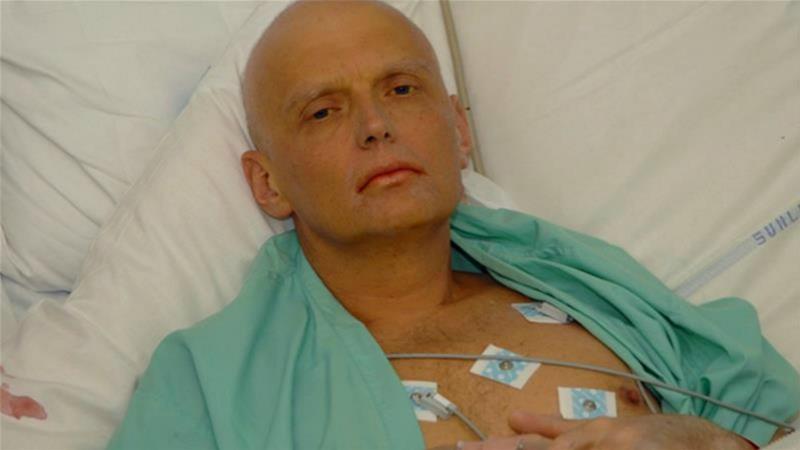
Source: ALJAZEERA
A British judge is due to release the findings of a public inquiry into the killing of ex-KGB agent Alexander Litvinenko in a notorious murder case that sorely tested UK-Russia relations.
Litvinenko, a Russian spy turned dissident who lived in exile in the UK, died in November 2006 three weeks after drinking green tea laced with radioactive polonium-210 at London's plush Millennium Hotel.
From his deathbed, the 43-year-old told detectives that Russian President Vladimir Putin had directly ordered his killing.
The Kremlin dismissed that claim as ridiculous at the time and has always denied involvement.
British police accused Dmitry Kovtun and Andrei Lugovoi, the two Russians Litvinenko met for tea, of carrying out the killing. Both deny involvement, and Moscow refuses to extradite them.
Poisoned to death
The inquiry heard from 62 witnesses over six months of public hearings and - behind closed doors - saw secret intelligence evidence about Litvinenko and his links to UK spy agencies.
Litvinenko's widow Marina told the inquiry that her husband was a loyal intelligence agent who grew disillusioned with Russia's 1990s war in Chechnya and by what he saw as corruption within the FSB security service, the successor to the KGB.
He fled to Britain in 2000 and was granted asylum, becoming an outspoken critic of Putin and his allies.
When he became violently ill in November 2006, Litvinenko's doctors initially diagnosed him with a stomach infection.
But as his condition worsened, his white blood cell count plummeted, making him susceptible to infection.
"His skin had turned yellow, indicating liver dysfunction, and he was tested for the two most likely causes, hepatitis and Aids, but neither was the case," John Emsley wrote in Molecules of Murder, a crime book that includes a chapter on polonium poisoning. "Then his hair began to fall out."
Doctors eventually decided that Litvinenko was suffering from radiation poisoning, and further tests identified polonium as the culprit.
Litvinenko's body was so radioactive that the autopsy was conducted by medics in protective clothing and ventilation hoods. A lawyer for the police said the killing may have exposed hundreds or even thousands of Londoners to radioactive contamination.
British detectives and scientists told the inquiry that a radioactive trail was left at hotels, restaurants and other sites across London visited by Kovtun and Lugovoi, a former agent for the FSB security service who is now a Russian lawmaker and was decorated by Putin for services to the nation.
Analysts believe that the judge - who said he has seen evidence of Russian state involvement - is likely to name Lugovoi and Kovtun as the culprits.
The big question is whether he will name Putin or people close to him as ordering the killing.
Tense relations
Litvinenko's death marked a post-Cold War low point in Anglo-Russian relations, and ties have never fully recovered. They were marred further in more recent years by Russia's annexation of Crimea and its support for Syrian President Bashar al-Assad.
British newspapers said Prime Minister David Cameron would chair a meeting of security chiefs ahead of publication of the report to consider what, if any, action Britain should take.
Igor Sutyagin, from the UK's Royal United Service Institute think-tank, told the Reuters news agency that he expected Britain would consider the report itself as sending out a message to the Kremlin.
"Everything which blames or is seen as an accusation against Russia is perceived in a very personal way by Vladimir Putin," he said. "He will react in a very angry way which will not help to improve relations with the UK."
But some believe it may be in the interests of both Britain and Russia to limit the fallout from the Litvinenko killing.
The two countries are both involved in air strikes against the Islamic State of Iraq and the Levant (ISIL). British diplomats believe Russia is key to ending that country's civil war, while Russia, whose economy is hurt by low oil prices, would like to see an end to sanctions.
The Soviet-era KGB, the predecessor to FSB, did not hesitate to kill its enemies on foreign soil, sometimes with obscure poisons. Bulgarian dissident Georgi Markov died after he was stabbed with a ricin-tipped umbrella on London's Waterloo Bridge in 1978.
No comments:
Post a Comment